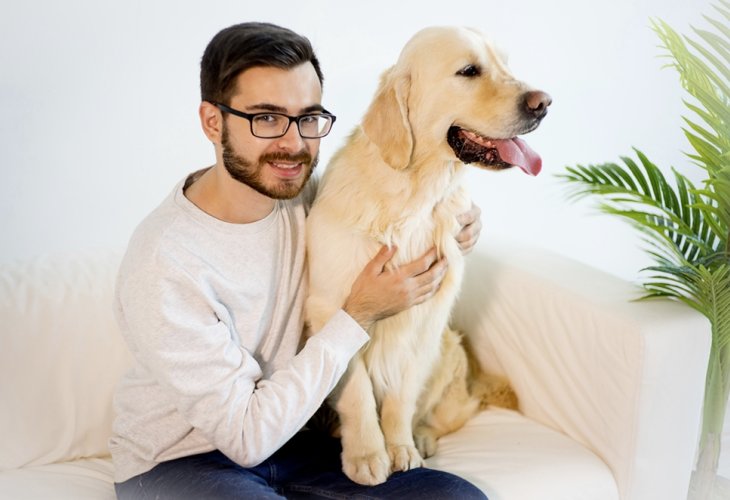Faith
Coping With the Loss of a Dog: Understanding Pet Love vs. Human Love
Learn how to process grief after losing a pet, why animal affection is instinctive, and what makes human love unique and lasting
 (Photo: shutterstock)
(Photo: shutterstock)Moran asks: “First, I want to thank you for your answers. I have a somewhat complex and sensitive question. As we know, the most common animal that people raise and become deeply attached to is the dog — whose very name in Hebrew, kelev, hints at being ‘all heart.’ A person who raises a dog for years becomes very connected, because he feels just how much the dog loves him — sometimes even more than other people… That’s why this is so hard for me: how can I cope with the loss of my dog, when I know how much he loved me, and now he’s gone forever? And also, why don’t animals have continuity in the afterlife like human beings do? Thank you in advance.”
* * *
Shalom, Moran, and thank you for your question. I’m glad you benefit from these answers.
I’m sorry for your pain. Notice however, that even your grief contains an important lesson for your soul — it reminds you that everything in this world is temporary, and that therefore we should invest our lives in eternal values.
To cope with loss, the best remedy is time. Anything a person grows attached to — whether a creature or an object that gave him many experiences and memories, will cause a sense of loss when it’s gone. The feeling is strongest because we grow used to its presence. Only time can ease that emptiness. Still, creating new experiences and memories helps too.
The Illusion of Humanizing Animals
It’s important to recognize that your strong attachment was based in part on a common illusion known as anthropomorphism — projecting human qualities onto animals. Somewhere in your heart, you may have felt as if you lost a person, not just a pet. That illusion weighs on your grief unnecessarily.
When we look at a dog or cat, we imagine what it’s like to be them, because our only reference point is human experience. In truth however, animals live with a different inner system. They lack self-awareness and free choice. Concepts like “compassion” or “cruelty” don’t exist in them — they act and feel as their Creator programmed them to.
Animals are part of nature, not separate from it. A zebra eaten by a lion does not ask, “Why is this happening to me?” or “Why do lions kill?” It simply lives and dies as nature directs. It may feel pain, but it doesn’t think about the pain. With no freedom of choice, it is bound to its instincts.
Instincts, Not Choice
All animals operate by instinct. A cat will therefore never be loyal like a dog, and a dog will never cover its waste like a cat. Each has traits fixed from birth.
Ants know how to march in lines, protect their queen, and build nests without ever being taught. Migrating birds can navigate thousands of miles, even blindfolded, because the map is hardwired into their brains. Salmon swim upstream to spawn and die — fulfilling their role without choice or reflection.
Even the “love” animals show is instinctive. A mother cat sacrifices for her kittens, but after a few months loses all interest in them, even fighting them for food. Later, she may even mate with them as with strangers — because nature designed this to ensure survival.
Likewise, a dog’s “love” is predetermined. It isn’t freely chosen, nor can it be increased or decreased at will. If another person had raised your dog and fed it as you did, it would have shown the same affection. Its behavior comes from DNA, not conscious choice. Animals can be trained because they lack free will.
The Pack Mentality of Dogs
Science explains that dog instincts come from wolves, who live in packs. Every wolf submits to an alpha male who leads and decides food distribution. If you tried reaching into your dog’s bowl or entering its kennel, it may have growled or snapped. That’s instinct, not malice.
Dogs don’t “naturally” love all humans. They protect their territory and their pack. They love their owners and close family, but not humanity in general. Even when they seem to show “more love than people,” this is a projection of human emotion onto instinctive behavior.
Human Love Is Different
Here lies the key difference: humans can choose how much to love, and whether to keep loving even in difficulty. A man can choose to remain faithful to his wife even during struggles. A mother can care for her child even when she is angry with him. Friends can remain loyal, or betray.
That is why the Torah commands us: “Do not hate your brother in your heart… Do not take revenge or bear a grudge… Love your neighbor as yourself, I am the Lord” (Vayikra 19:17–18). Such commands are meaningful only because humans have choice.
Animals cannot be commanded because they cannot choose love or hatred. Their behavior is fixed. Only people can transform themselves, love their enemies, forgive, and add unity to the world.
For this reason, human love will always be deeper and greater than animal attachment. Animal affection is automatic, while human love is chosen, nurtured, and given freely.
Putting Grief in Perspective
Of course, none of this erases your grief, but it may help put the experience in perspective. You did not lose a person — you lost a beloved creature whose loyalty and warmth reflected natural instincts. Treasure the good memories, let time heal the emptiness, and remember that unique love that truly lasts belongs to the human heart.
In the next article, we will explore your second question about the reason animals do not have a share in the afterlife.

